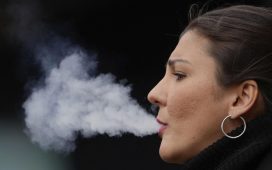TAMPA, Fla. (AP) – The future of Ybor City’s last working cigar factory will be rooted in the community’s past.
First, the J.C. Newman Cigar Co. will bring back The American – the first cigar ever rolled in the 1910 Ybor City factory that houses the family business. The cigar debuts today.
Then, in June, the company begins a multi-million-dollar renovation to convert 2,078 square feet of third-floor storage into space for hand-rolling – just like it was done in the days when Tampa was the cigar capital of the world.
The moves come as the industry is warning that it might go bankrupt in the face of U.S. Food and Drug Administration plans to begin regulating premium cigars. The change would force cigar makers to pay for lab testing of products they’ve put on the market since 2007.
“The FDA remains a threat,” said Drew Newman, 37, general counsel for J.C. Newman. “We are betting on the future and that we can keep the Tampa cigar-making tradition going.”
Tampa has a number of boutique operations where cigars are rolled by hand, as they were when Spanish entrepreneur Vicente Martinez-Ybor brought the industry to Tampa in 1885. It eventually grew to more than 150 factories.
But only the Newmans still produce cigars on a commercial basis locally and they have always used machines in their 97,000-square-foot Ybor City factory.
“We like our antique hand-operated machines and will continue to use them,” said Newman, the fourth generation of his family to work for the cigar company. “At the same time, we want to showcase the hand cigar-making tradition of Tampa.”
The American first was produced in the Newman factory when it was home to E. Regensburg & Sons Cigar Co. Unlike the original, though, this cigar will be true to its name. From the tobacco to the ink on the band, everything is made in America – a claim no other cigar manufacturer has ever been able to make, Newman said.
Construction of the hand-rolling space will finish in time for J.C. Newman’s 125th anniversary in January. The company was established in Cleveland in 1895 as a hand-rolled cigar operation, purchased machines in the 1930s, and brought them along with its move to the Ybor City factory in 1954. The historic, three-story brick building is at 16th Street and Columbus Drive.
Tours will be offered and Newman expects they’ll be popular.
“Just as people travel from all over the world to visit Napa Valley to taste wine,” he said, “we want to create a destination for cigar enthusiasts.”
Twelve people will work in the hand-rolling section, making The American and other premium cigars. Another 135 people will continue working the machines that turn out more than 500 blends.
J.C. Newman already has built up a stock of The American cigars. Since 2017, two employees have been hand rolling 200 of them a day. They sell for up to $19.50 each, $390 for a box of 20.
The American will debut in two upscale stores – Davidoff of Geneva Since 1911, at 4142 W Boy Scout Blvd. in Tampa, and Corona Cigar Co. in Orlando. They will later be available nationwide.
Both stores are owned by Jeff Borysiewicz, who harvests tobacco at his 20-acre Florida Sun Grown tobacco farm in Clermont.
Before Borysiewicz planted his first seeds in 2013, tobacco had not been grown in Florida since 1977.
“Florida stopped growing tobacco because it is not affordable,” he said. “It can be grown for a fraction of the price in South America and the Caribbean. Cigar rollers overseas work for a fraction of the cost as here.”
He and Newman are expanding in the belief that tradition will trump dollars and cents.
Borysiewicz supplies the wrapper for The American. The binder tobacco is grown in Connecticut and the filler in Pennsylvania. The boxes are made in Miami, the labels in Sanford, and the cigar molds in Dade City.
“Even the ink comes from North Carolina and the cellophane from Pennsylvania,” Newman said.
Eric Newman, company president and Drew Newman’s 71-year-old father, said he thought at first that his son was crazy to launch these new endeavors now.
“Visionaries are often unbalanced,” Eric Newman said with a laugh. “Drew wants to make our factory a real destination.”
During tours, the hand rolling space will even employ a lector to read for the factory workers in the tradition of Cigar City’s heyday.
“You’ll feel like you’ve been transported back to the Ybor of the early-1900s,” Drew Newman said.
It’s an era that inspired the return of The American. A flag bearing the brand flies from the factory’s clock tower in a photo from 1910 that still hangs inside.
The photo also serves as the label inside the new cigar box.
While preparing for renovations, the Newmans uncovered another piece of the factory’s history.
Covered by a carpet near a vault on the first floor is a trap door for a hidden staircase leading to the basement. The staircase was used an escape route for protecting company funds from robbers, Eric Newman said.
Tampa could be a lawless city, Newman noted, and he’s heard that mafia henchmen targeted the factory on a regular basis.
Tour groups will love the story, but Newman is glad those days have passed.
“That is one part of our history that we don’t want to recreate.”
___
Information from: Tampa Bay Times (St. Petersburg, Fla.), http://www.tampabay.com.
The Washington Times Comment Policy
The Washington Times welcomes your comments on Spot.im, our third-party provider. Please read our Comment Policy before commenting.






